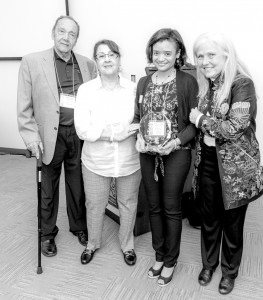Louisiana Creole Research Association honors photographers for their work in preserving history
18th November 2019 · 0 Comments
By Hannah Joy Shareef
Contributing Writer
Through his camera lens, award-winning photographer Harold F. Baquet documented African-American political and daily life in his native city of New Orleans.
Baquet’s contribution to society was recognized posthumously on October 25 by the Louisiana Creole Research Association, who honored the life and legacy of Baquet as part of the 15th Annual Conference on Louisiana Creole History and Culture. In Baquet’s honor, his widow, Cheron Brylski, accepted the award on his behalf.
“My husband was not only a photographer, he was a storyteller with a keen eye and love for his city,” Brylski said. “He wanted to make people feel something. Photography is an art. It can bring back the feelings, sounds and smells of the captured moment,” said Brylski, who is an alumna of Loyola University New Orleans and an award-winning writer.

Louisiana Creole Research Association chairperson Chantell Nabonne, second from right, is shown with the family of Harold Baquet who was honored posthumously during the asscoiation’s 15th annual conference on Louisiana Creole history and culture. From left are siblings Albert Nicholas, Velva Flot, and at right, is Baquet’s widow, Cheron Brylski. An award-winning photographer, Baquet’s catalogue of work is deposited and displayed at The Historic New Orleans Collection and Loyola University.
Because of his love for photography, Baquet’s catalogue of work is deposited and displayed at The Historic New Orleans Collection and Loyola University. His career started as a photographer for African-American newspapers in New Orleans including The Louisiana Weekly. He followed up his work in the press by taking on assignments at city hall. His photography provides a deep look inside mayor Ernest N. Morial’s years in office, where he served as a staff photographer for the city’s first Black mayor. He also documented mayor Sidney Bathelemy’s time in office.
He then served as the university photographer at Loyola for 25 years. Baquet died in 2015 but had been a vibrant resident of the city, who captured creole families and their heritage in the 7th and 8th wards of the city. Baquet was also of creole ancestry, was a parishioner at Corpus Christi church on St. Bernard Avenue, and attended St. Augustine High School. While his life is centered around generations of creole families in the city, he avoided the label.
“He often rebelled against being called creole, because he wanted to own the African American part of his identity,” Brylski said. “African American life in New Orleans consisted of educators, musicians, and hard-working families. Everyday life in New Orleans was fun, exciting… and rooted into a unique culture,” she said, adding that this diversity of the Black experience in the city was what he aimed to immortalize through photography.
At the Louisiana Creole Research Association luncheon, board chair Chantell Nabonne said the mission is to keep the legacy of New Orleans’ creole community alive. The organization helps creole families research their ancestry, and remember important figures who have been forgotten.
“The people today are being honored because they help keep history alive,” Nabonne said. “Every time I saw Mr. Baquet across campus he would yell, ‘Hey Cousin!’ His photography, smile, and life will forever live on. I will truly miss my cousin,” said Nabonne, who also graduated from Loyola University-New Orleans with a degree in Elementary Education.
This year’s conference also honored photographer Cedric A. Ellsworth, whose photography is the subject of a new exhibit that opened at the conference entitled, “Picturing Creole New Orleans: The Photographs of Arthur Bedou,” who Ellsworth studied and who also took a childhood family portrait of Ellsworth and his parents. Bedou, an African-American photographer, was the personal photographer of Booker T. Washington, and documented the last years of Washington’s life. Cedric Ellsworth’s cousin, Keith Ellsworth, also accepted an award on behalf of the Autocrat Social & Pleasure Club, whose founders were also honored at the 2019 conference for their historical role and contribution to the community. The Ellsworth family has supported the Louisiana Creole Research Association’s work to preserve little known histories of families in the city.
“It’s people like Harold Baquet that give people hope. This association is about giving people knowledge that they can pass on to generations in the future,” said Ellsworth, who was born and raised in New Orleans.
The “Picturing Creole New Orleans” exhibit is on display at Xavier University’s library center and is curated by art-historian Dr. Mora Beauchamp-Byrd who is a visiting professor at Oklahoma State University. The exhibit is a collaborative project between Xavier and the Creole Association. Harold Baquet’s photography is part of a permanent collection with the Historic New Orleans Collection and at Loyola.
“Harold’s work will live on forever because we will continue to share and talk about his contributions. What he had was a gift beyond this world,” Ellsworth said.
This article originally published in the November 18, 2019 print edition of The Louisiana Weekly newspaper.



